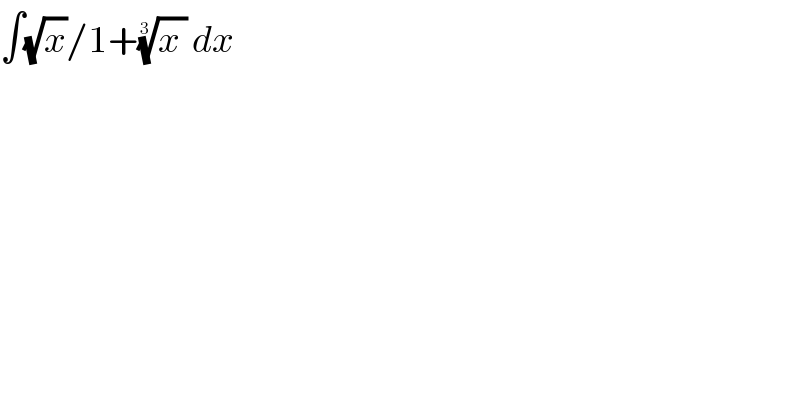Question Number 68095 by mhmd last updated on 04/Sep/19

$$\int\sqrt{{x}}/\mathrm{1}+\sqrt[{\mathrm{3}}]{{x}\:}\:{dx} \\ $$
Answered by MJS last updated on 05/Sep/19
![∫(x^(1/2) /(1+x^(1/3) ))dx= [t=x^(1/6) → dx=6x^(5/6) dt] =6∫(t^8 /(t^2 +1))dt=6∫(t^6 −t^4 +t^2 −1+(1/(t^2 +1)))dt= =(6/7)t^7 −(6/5)t^5 +2t^3 −6t+6arctan t = =(6/7)x^(7/6) −(6/5)x^(5/6) +2x^(1/2) −6x^(1/6) +6arctan x^(1/6) +C](https://www.tinkutara.com/question/Q68111.png)
$$\int\frac{{x}^{\mathrm{1}/\mathrm{2}} }{\mathrm{1}+{x}^{\mathrm{1}/\mathrm{3}} }{dx}= \\ $$$$\:\:\:\:\:\left[{t}={x}^{\mathrm{1}/\mathrm{6}} \:\rightarrow\:{dx}=\mathrm{6}{x}^{\mathrm{5}/\mathrm{6}} {dt}\right] \\ $$$$=\mathrm{6}\int\frac{{t}^{\mathrm{8}} }{{t}^{\mathrm{2}} +\mathrm{1}}{dt}=\mathrm{6}\int\left({t}^{\mathrm{6}} −{t}^{\mathrm{4}} +{t}^{\mathrm{2}} −\mathrm{1}+\frac{\mathrm{1}}{{t}^{\mathrm{2}} +\mathrm{1}}\right){dt}= \\ $$$$=\frac{\mathrm{6}}{\mathrm{7}}{t}^{\mathrm{7}} −\frac{\mathrm{6}}{\mathrm{5}}{t}^{\mathrm{5}} +\mathrm{2}{t}^{\mathrm{3}} −\mathrm{6}{t}+\mathrm{6arctan}\:{t}\:= \\ $$$$=\frac{\mathrm{6}}{\mathrm{7}}{x}^{\mathrm{7}/\mathrm{6}} −\frac{\mathrm{6}}{\mathrm{5}}{x}^{\mathrm{5}/\mathrm{6}} +\mathrm{2}{x}^{\mathrm{1}/\mathrm{2}} −\mathrm{6}{x}^{\mathrm{1}/\mathrm{6}} +\mathrm{6arctan}\:{x}^{\mathrm{1}/\mathrm{6}} \:+{C} \\ $$
